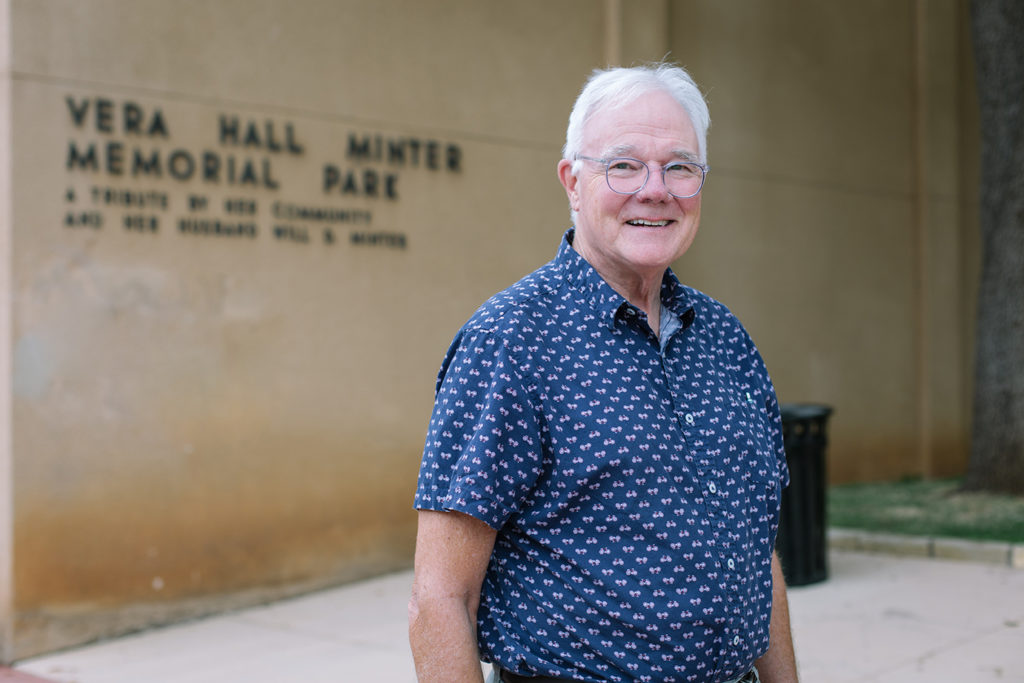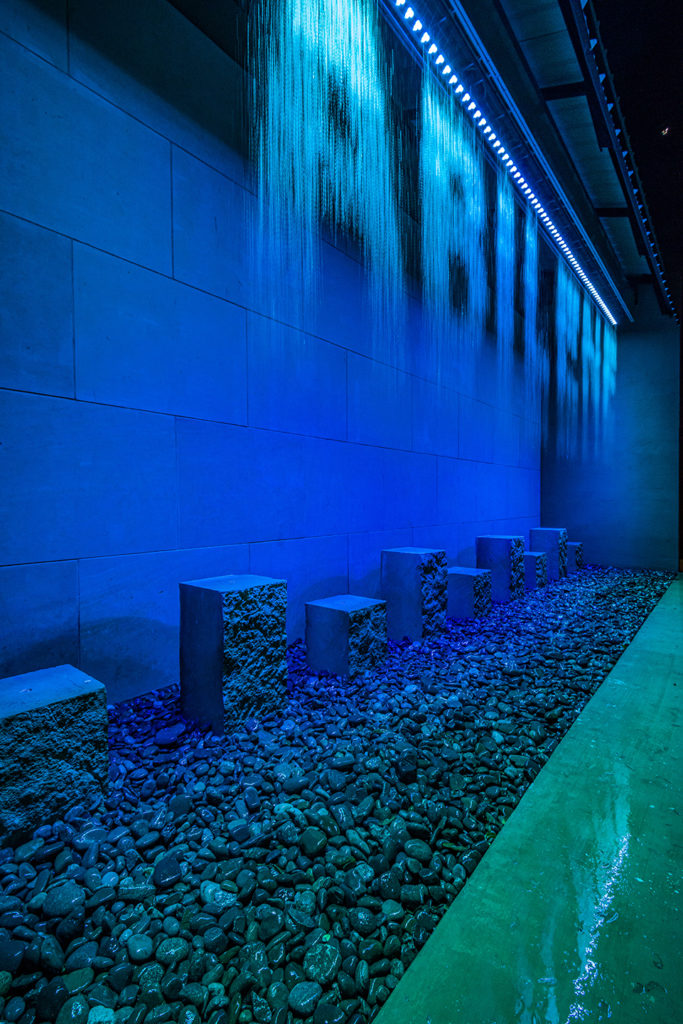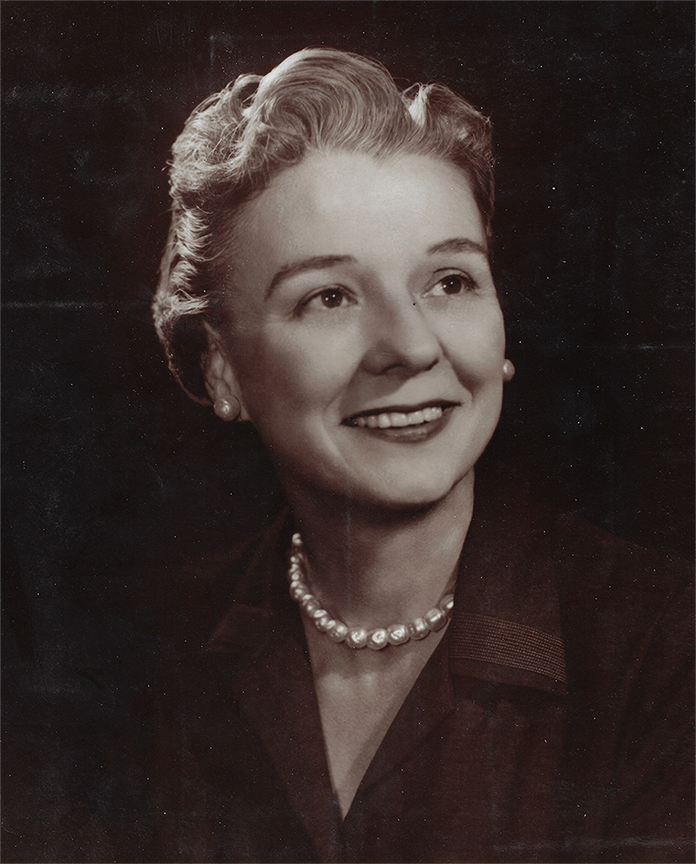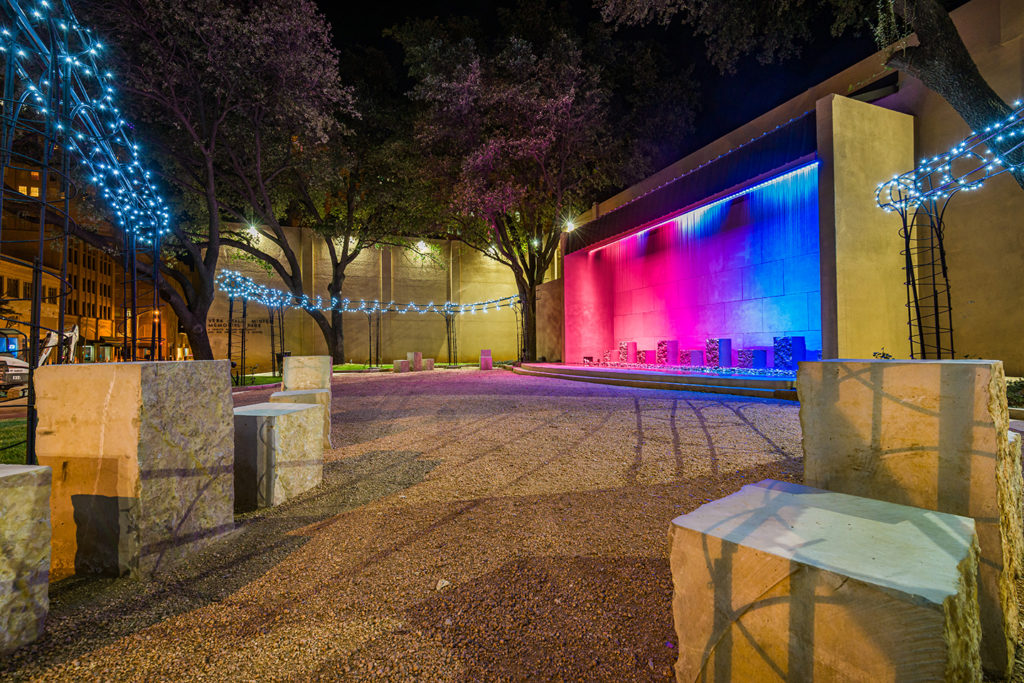The pleasant sound of crashing water forms the centerpiece of Vera Hall Minter Memorial Park ever since it originally opened in downtown Abilene in 1976.
The re-imagined park has all the bells and whistles of a 21st century, urban pocket park, but with one prominent feature that never goes out of style – water. The original park was graced with a waterfall on the back wall of the building behind it. In its place is a water curtain, a thin sheet of water that, through the wizardry of computerization, can display shapes and words falling from the top, shimmering through the water, lit naturally during the day or by computer-controlled lights. The water can be shut off so that the limestone backdrop can be used as a projection screen.
“It’s a great sound,” said Kevin Halliburton, an architect with Weatherl & Associates who conceptualized the water curtain. “There is no other sound like it in the world.”
No doubt lifetime-Abilenian Vera Hall Minter would agree. On what would have been her 111th birthday, she was once again celebrated by her family and the community she loved and served. On that special day, July 7, 2020, the totally redesigned Vera Hall Minter Memorial Park reopened to the public after being closed for several months.
The date selected for the reopening wasn’t intentionally chosen to coincide with Vera Hall Minter’s birthday, but it didn’t go unnoticed by her son, Will D. Minter Jr., or Bill Minter as he is better known.
“I don’t know how that happened,” Minter said. “It was a wonderful remembrance and gave extra special meaning to that.”
On July 7, 1909, Vera Hall was born in Abilene to Martha Ozella “Ozia” Hall and Emmett Hall. She died on May 18, 1961, at age 51. In the mid-1970s, fundraising began to honor the woman whose life was spent in civic betterment with a downtown memorial park. The park was dedicated on April 4, 1976.
The story of this park spans over a century – today’s renovated park was preceded by the 1970s waterfall structure, which was preceded by a great theatre built in the early 1900s, and even before that, a family that helped establish Abilene in its pioneer days.
The Park’s Design
The original park was the brainchild of the late Frances Brooks, who was active in the Abilene Garden Club and civic beautification projects. She joined forces with the
late Ed Wishcamper, who at the time was editor of the Abilene Reporter-News and president of the Kiwanis Club of Abilene Foundation, which served as the primary sponsor for the park. Ed and Louise Wishcamper had been impressed with urban pocket parks they enjoyed in their European travels and thought downtown Abilene would benefit from one.
Wishcamper also had a birds-eye view of the deteriorating Queen Theater, which would be razed to make way for the proposed park. At the time, the Reporter-News editor’s office had a window that overlooked the corner of Cypress and North Second streets, where the park is located.
“It was easy for him to envision something nice to look at,” Bill Minter said. 
A proposal for the park was presented to Bill and Will D. Minter Sr., who owned the property where the theater was located, on the day after Christmas, 1973. At length, the elder Minter considered the proposal and eventually agreed to donate the property for the park. An editorial in the Reporter-News dated March 16, 1976, one day after the elder Minter’s death, noted that Minter had voiced his wishes about the park. Among those were that the sponsoring Abilene Kiwanis Club “carry it out with good taste, in low key, and without high pressure efforts for contributions.”
Those wishes were granted but Minter did not live to see the park opening. His death on March 15, 1976, came just weeks before the park was dedicated on April 4, 1976.
Wishcamper, who died in 2001, was editor of the Reporter-News from 1968 to 1979. As the newspaper editor and president of the Kiwanis Club of Abilene Foundation when the park was proposed, Wishcamper saw to it that fundraising efforts got plenty of publicity. The newspaper featured stories and editorials on a regular basis.
The total cost of the original park was $46,162.42 and was paid for by donations from citizens, businesses, and organizations. A contribution form titled “A Gift to the Park” was published in the newspaper every day to make it easy to donate. On Sunday, May 19, 1974, a boxed story said, “Abilene Classroom Teachers kicked off the fund campaign for the Vera Hall Minter Park with a $100 check to the sponsoring Abilene Kiwanis Club Foundation.”
Water Curtain Dazzles
Fast-forward to 2020 and that $46,162.42 sounds like a paltry sum, but it was a substantial amount in the mid-1970s.
The 2020 renovation cost $500,000 by comparison and was funded through a variety of sources, including private donations, Tax Increment Reinvestment Zone (TIRZ) funds, and grants, with about 20 percent coming from the city budget, said Richard Rodgers, assistant director of community services for the city of Abilene.
The park, which is wheelchair accessible, is for use by the public at no charge. However, for a fee anyone can have shapes or slogans displayed in the water curtain. No advertisements or inappropriate messages will be allowed. For example, the water curtain can be used for special programs like displays during the annual Children’s Art & Literacy Festival (CALF) for an hourly fee.
Rodgers is excited about the positive feedback the city has received and expects the innovative park to serve the city for years to come.
“We feel pretty good about how long it’s going to last,” Rodgers said.
Equally enthusiastic are Halliburton, the architect behind the design, and Clint Rosenbaum, who also served on a committee that was tasked with the redesign. Rosenbaum Engineering completed the engineering plans after Halliburton and Weatherl Associates conceptualized the park. Bontke Brothers was the contractor that did the demolition of the old park and built the new one. Rosenbaum worked with the contractor and Aqua Reign, which manufactured the water curtain mechanism. It was a first-of-its kind project for Rosenbaum, who has done other jobs for the city.
At its opening, the Minter Park water curtain was believed to be the largest outdoor water curtain in the U.S. It operates with hundreds of nozzles that can be programmed to turn on and off to drop words or shapes, like a giant ink jet printer, Halliburton said. 
Downtown Abilene Ebbs & Flows
When the park first opened in 1976, response to it was just as enthusiastic as it has been for the redesigned park. The beginning of the revitalization of downtown Abilene was still a decade away and downtown did not have the buzz it enjoys today. That was before the Paramount Theatre was restored to its original splendor and before the old Grace Hotel was transformed into the stunning Grace Museum. It was before the National Center for Children’s Illustrated Literature was even a thought.
The Queen Theatre opened to great celebration in 1916 on the spot that previously had been the home of Fulwiler Livery Stable. A Chamber of Commerce picture book that was published in 1916 featured a picture of the ornate Queen, with the caption, “The city’s newest and finest theater, just complete.”
But by the 1960s, traffic, and movie theater customers, declined in downtown Abilene, signaling the demise of the city’s once finest theater. The Queen Theatre, a once beautiful
Abilene landmark designed by famed architect David S. Castle, had deteriorated as noted by Texas Consolidated Theatres, Inc., a Dallas-based company that leased it. The building was owned by William D. Minter Sr., who also owned Minter Dry Goods Co. on Pine Street, where Under One Roof now is located. A letter to Minter from W.E. Mitchell with Texas Consolidated Theatres dated May 4, 1965, paints a portrait of downtown Abilene in the 1960s and 1970s, before restoration of historic buildings started in the mid-1980s.
The letter informed Minter that “after a great deal of deliberation and discussion” the company had reached a conclusion about future leasing of the Queen Theatre.
“Because of the unstable and unsettled condition of downtown Abilene,” Mitchell wrote, “it was suggested that we work out a lease with you on the building for another twelve months, and take a second look at its expiration date.”
“There was virtually zero interest in anyone wanting to operate a theater” in downtown Abilene, said Bill Minter.
The idea of razing it and filling that site with a park soon caught on, and it became a community effort. In addition to donations from citizens and organizations, the 96th Civil Engineering Squadron at Dyess Air Force Base cleared the rubble once the theater was demolitioned. And, according to a Reporter-News article about the dedication, Taylor County Precinct 1 Commissioner Berl Chapman and his employees filled in the site after it was cleared.
All that effort and civic pride was put into a park that paid tribute to one of the city’s proudest boosters, Vera Hall Minter. Lettering on a wall of the park says, “Vera Hall Minter Memorial Park” in large letters. Smaller letters say, “A Tribute By Her Community And Her Husband Will D. Minter.” 
Minter, Hall Roots Run Deep
The names “Minter” and “Hall” have deep roots in Abilene. Will D. Minter Sr.’s grandfather, Will A. Minter Sr., was a Buffalo Gap merchant beginning in 1879. He moved his family to Abilene three weeks before the town lot sale on March 15, 1881. In Abilene, he not only was a prosperous merchant, but also was a founder of the city’s first church, First Presbyterian, which had its first service in a tent on Feb. 27, 1881. That historic moment and site are enshrined in a plaque embedded in the sidewalk at North First and Pine streets.
Will D. Minter Sr. was a third-generation Abilenian and the second generation to head Minter Dry Goods. Co, which was started by his father, Will A. Minter Jr., in 1900. In addition to running his dry goods business, Will D. Minter Sr. was a civic leader, serving as a director of both First National Bank and Abilene Savings Association. He also was a director of the Chamber of Commerce, president of the Exchange Club and supported the YMCA and the United Way.
Vera’s family was equally well known in Abilene. Vera Hall’s parents, Emmett and “Ozie” Hall, owned Hall Music. Co., established in 1908, next door to Minter Dry Goods Co. on Pine Street. One of Vera’s brothers, Elbert E. Hall, was mayor of Abilene in 1980-1984. He also was the father of singer/composer Carol Hall, best known for writing the music and the lyrics to the Broadway hit, “The Best Little Whorehouse in Texas.” Carol Hall died in 2018 at age 82.
“The Halls were a very musical family,” said Bill Minter, a cousin to Carol Hall.
They, and the Minters, also were civic-minded, a trait which has carried on through the generations. Bill Minter is retired as the executive director of the Abilene Preservation League and grew up aware of his family’s deep ties to Abilene’s history. His mother was born and raised in Abilene. She attended the University of Texas at Austin for two years and graduated in 1930 from Hardin-Simmons University. Vera Hall married Will D. Minter Sr. in 1934 and they had two children, Julie and W.D. “Bill” Minter Jr.
Vera Hall Minter was supportive of various organizations, including the Philharmonic Orchestra and the Abilene Public Library. She also served on committees at her church, First Presbyterian (now First Central Presbyterian), and was a Cub Scouts den mother and on the board of directors of the West Texas Girl Scout Council. At the time of her death, she was advisory chair of the Abilene Philharmonic Guild, vice president of the Abilene Museum of Fine Arts, and was former president of the Abilene Panhellenic Association.
She was chair of the Library Advisory Committee in 1956 when a bond election was passed that built the current library at 202 Cedar St. Books were a passion of Vera Hall Minter. She once wrote a column for the Abilene Reporter-News under the heading “Books That Have Influenced Me.” In it, she told of browsing through the family library and finding old favorites in various sections, such as children’s books, the Dickens group, and pleasure reading. She ended the column by divulging that the book she had enjoyed most in her lifetime was “Winnie the Pooh.”
“I have read it every night for 14 years to my children,” she wrote, “and I love every character as much as they do.”
Bill Minter was only nine when his mother died in 1961 at age 51. He knew from his short time with his mother that she “was a good mom, too,” in addition to the person that the public knew and appreciated. Not only was Vera Hall Minter active in her church and with civic improvements, she genuinely liked the people the civic improvements would serve. In a video prepared by the city’s Parks & Recreation Department, Bill Minter gave a brief history of the original park and his family. He described his mother as “someone who liked to make things happen” in the city. But he also added an even better characteristic.
“She was a real people person,” Minter said. “She had many friends of all types throughout Abilene.”
Summer 2020
A young couple sits on two facing limestone blocks with a larger block between them, serving as a table for their lunch. 
Leafy trees surround them, providing shade. Behind them, the sound of a water curtain cools them, even though the temperature is over 100 degrees on a summer afternoon. The water splashes on rocks and more limestone blocks at the foot of the water curtain.
And like Vera herself, the park remains a faithful “friend” to Abilene.
By Loretta Fulton
























Leave a Reply